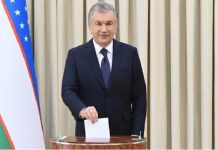Introduction
Security and foreign policy play crucial roles in shaping the trajectory of nations on the global stage. The President of Uzbekistan, at the helm of the country’s leadership, has outlined key priorities to address the complex challenges in the realms of security and foreign relations. This article delves into the strategic objectives and initiatives undertaken by the President of Uzbekistan to ensure the well-being and prosperity of the nation.
I. Historical Context
To understand the current security and foreign policy priorities of Uzbekistan, it is essential to consider the historical context. Uzbekistan, located in Central Asia, has undergone significant geopolitical shifts since gaining independence in 1991. The nation has had to navigate regional dynamics, economic challenges, and security threats, influencing the formulation of its foreign and security policies.
II. Strengthening Regional Cooperation
One of the central tenets of the President’s foreign policy is the promotion of regional cooperation. Uzbekistan recognizes the interconnectedness of regional stability and its own security. Initiatives such as the Central Asia-South Asia power project and efforts to enhance economic ties with neighboring countries underscore the commitment to fostering a collaborative regional environment.
III. Countering Transnational Threats
In an era marked by evolving security threats, Uzbekistan places a high priority on countering transnational challenges. The President has emphasized the importance of international collaboration in addressing issues such as terrorism, extremism, and organized crime. Bilateral and multilateral agreements with key partners contribute to intelligence sharing, joint training programs, and coordinated efforts to combat emerging threats.
IV. Economic Diplomacy
Economic diplomacy features prominently in the President’s foreign policy agenda. Recognizing the role of economic stability in ensuring national security, Uzbekistan has actively pursued partnerships that bolster trade, investment, and technological exchange. The diversification of economic partnerships helps build resilience against external shocks and enhances the nation’s standing in the global economy.
V. Humanitarian Diplomacy and Soft Power
The President of Uzbekistan recognizes the significance of soft power in shaping global perceptions. Humanitarian diplomacy, including cultural exchanges, educational programs, and international aid initiatives, serves as a means to build positive relationships with the international community. The promotion of Uzbek culture, language, and heritage enhances the nation’s global influence and fosters mutual understanding.
VI. Regional Conflict Resolution
Uzbekistan, situated at the crossroads of Central Asia, actively engages in regional conflict resolution efforts. The President has been involved in diplomatic initiatives aimed at addressing long-standing regional disputes, contributing to stability in the broader Central Asian context. Mediation and dialogue are central to Uzbekistan’s approach in resolving conflicts and promoting lasting peace.
Conclusion
The President of Uzbekistan navigates the complex terrain of security and foreign policy with a nuanced approach that reflects the nation’s historical context, current challenges, and future aspirations. By prioritizing regional cooperation, countering transnational threats, engaging in economic diplomacy, and wielding soft power, Uzbekistan aims to secure its national interests while contributing to global stability and prosperity. As the geopolitical landscape continues to evolve, the President’s strategic vision will play a pivotal role in shaping Uzbekistan’s trajectory on the world stage.







